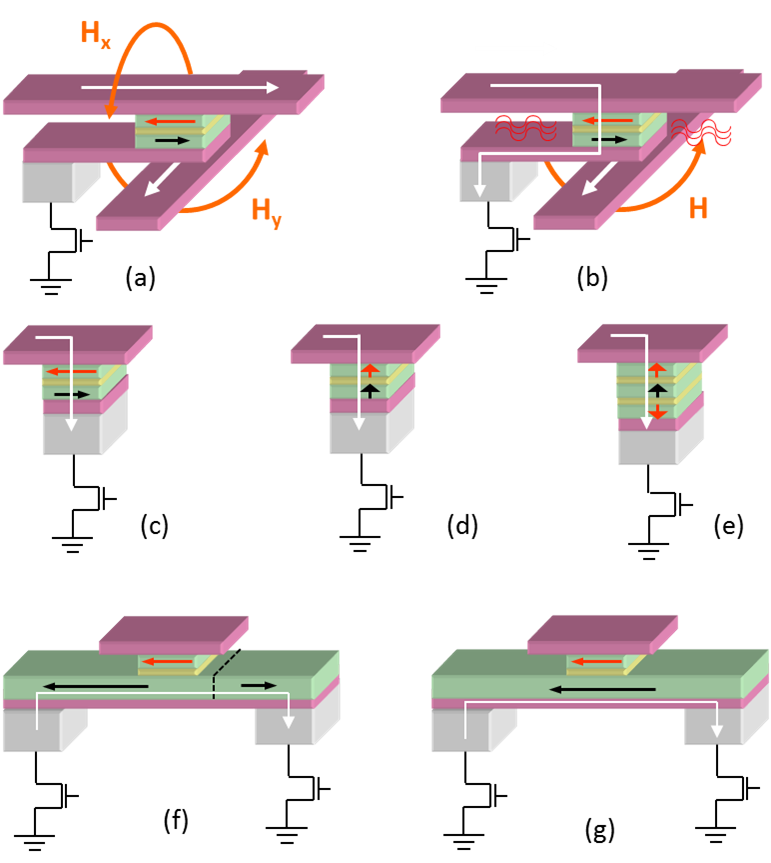Thematic overview
Magnetic Random Access Memories (MRAM) is a non-volatile memory technology, where information is stored by the magnetization direction of magnetic electrodes, very similar to computer hard-disk drives. The goal for MRAM memory is to simultaneously achieve high-speed read/write times, high density and unlimited cycling compared to other existing and emerging technologies.
Our group is developing advanced MRAM cell concepts patented at Spintec. The concepts are based on the use of temperature to reduce power consumption and increase the stability of the stored information. These ideas go beyond the conventional MRAM approach. The naturally occurring temperature increase during the write step is not lost, but is instead used to achieve the seemingly opposing goal of lowering the power consumption and increasing the thermal stability in the operating temperature range. Our group fosters young and experienced researchers developing/applying their expertise in the field of MRAM.

Questions to be addressed
Our main research axis is to use the naturally occurring temperature increase during the write step, when a current flows through the magnetic tunnel junction. The heating is used to go above a temperature threshold, making it possible to write the storage layer magnetization. This principle has been applied to in-plane magnetization cells using a storage layer pinned by an anti-ferromagnet and recently to perpendicular anisotropy cells. Our group’s goal is to demonstrate the proof-of-concept and then improve MRAM cell properties.
Our work involves the development of magnetic material systems, nano-fabrication (20-200nm cells), characterization of devices (magnetic & electrical) and simulation of the device behavior. Our activity in these vast fields is as follows;: On materials research, we are developing magnetic tunnel junctions with in-plane and perpendicular magnetic anisotropy. New electrode stacks having the material properties required by each specific concept need to be integrated in magnetic tunnel junctions, while achieving high levels of TMR signal. For the characterization of each concept we determine the write window parameters in terms of magnetic field, power consumption and magnetization reversal dynamics. Macrospin and micromagnetic simulation provide a better physical understanding of the system properties and the possibilities for optimization.
Projects
ANR EXCALYB – Perpendicular Anisotropy Materials for High-Density Non-volatile Magnetic Memory Cells
Crocus R&D – Thermally assisted MRAM
Samsung SGMI
Partners
Crocus Technology
Institut Néel
SP2M/NM
SAMSUNG
Applied Materials
SINGULUS
Recent news
- Post-Doctoral and fixed term R&D Engineer openings at SPINTEC [December 16th, 2024]
Project: SPINTEC offers several 24-month positions for postdoctoral researchers or research engineers, funded by the EU and French National Research Agency ANR. The projects focus on spintronic innovations for a sustainable digital technology, emphasizing advanced ... - Impact of external magnetic field on Spin Transfer Torque magnetic memory operation [December 09th, 2024]
The extent to which an external magnetic field can influence the operation of Spin-Transfer-Torque Magnetic Random Access Memory (STT-MRAM) remains a critical question within the microelectronics industry in particular regarding its use in automotive industry. ... - Seminar – Selected applications and trends in magnetoresistive sensors [November 25th, 2024]
On Friday November 29, 2024 at 13:30 we have the pleasure to welcome Johannes Paul from SENSITEC. He will give us a seminar entitled: Selected applications and trends in magnetoresistive sensors Place: IRIG/SPINTEC, CEA Building 10.05, auditorium ... - Seminar – Embedded STT-MRAM – Building Trust and Moving Ahead [November 25th, 2024]
On Friday November 29, 2024 at 10:00 we have the pleasure to welcome Johannes Müller from GlobalFoundries. He will give us a seminar entitled: Embedded STT-MRAM – Building Trust and Moving Ahead Place: IRIG/SPINTEC, CEA Building 10.05, ... - A dipolar core-shell perpendicular shape anisotropy memory cell [July 08th, 2024]
We propose the concept of a core-shell composite structure coupled antiparallel via dipolar interaction, as the storage layer in perpendicular-shape-anisotropy magnetic random access memory (PSA MRAM). Benefits compared with a standard PSA MRAM include a ...
SOUSA Ricardo
ricardo.sousa@cea.fr
BALTZ Vincent
vincent.baltz@cea.fr
PREJBEANU Lucian
lucian.prejbeanu@cea.fr
DIENY Bernard
bernard.dieny@cea.fr
